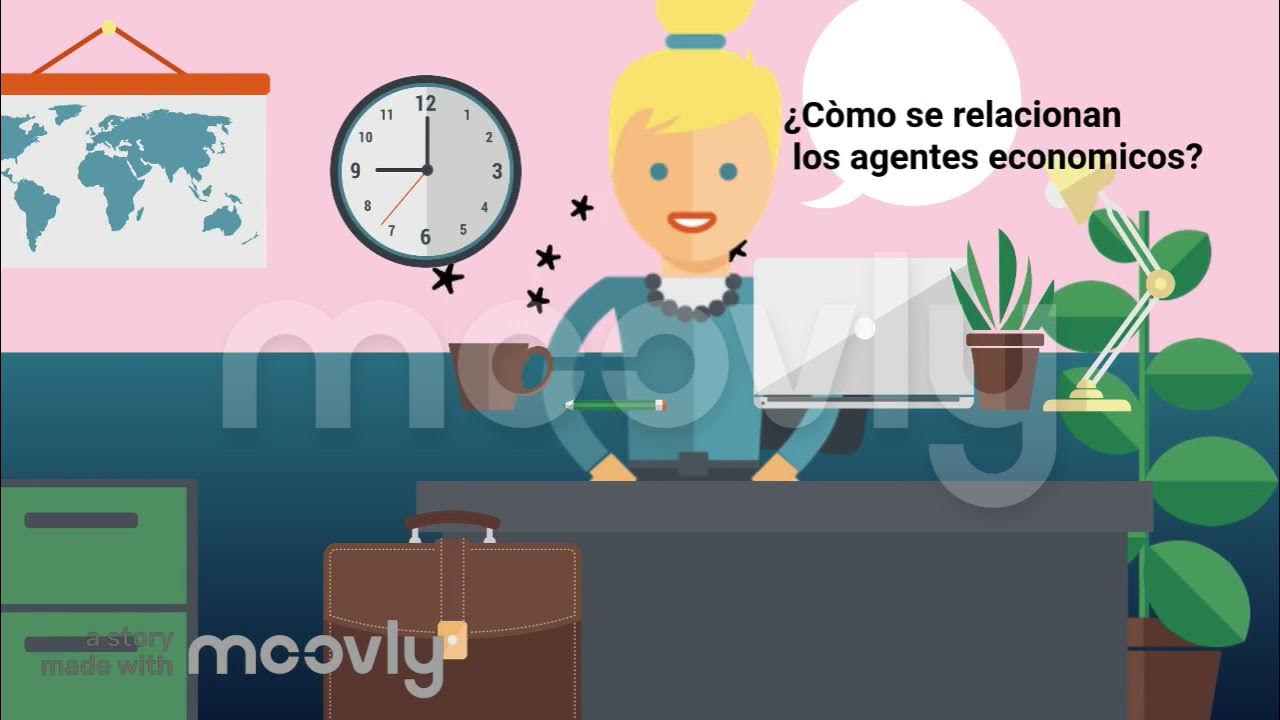¿Qué son los AGENTES ECONÓMICOS y qué tipos hay?📈
Summary
TLDRThe video explains the roles of economic agents—families, companies, and the state—within an economy. Families act as both consumers and producers, offering labor and resources, while companies use these resources to produce goods and services. The state regulates and redistributes wealth, acting as both a consumer and producer. These agents interact through consumption and production activities, creating a dynamic and interconnected economy. The video highlights how the proper functioning of each agent is essential for economic stability, with each one fulfilling critical roles that influence the overall economic system.
Takeaways
- 😀 Economic agents are individuals, institutions, or groups that make decisions within an economy, influencing its functioning and rules.
- 😀 The three main economic agents are families (consumers), companies (producers), and the state (market regulator), each with different roles but interconnected relationships.
- 😀 Economic agents can play dual roles, such as families acting as both consumers and producers, and companies acting as consumers for materials.
- 😀 Families are economic units responsible for consumption and ownership of production resources (mainly labor). They can also engage in self-consumption, particularly in less developed regions.
- 😀 Companies produce goods and services using the factors of production provided by families. In exchange for these, they pay wages, interest, dividends, or rent to families.
- 😀 The state is a public institution that both supplies and demands goods and services. It can also collect taxes and redistribute resources through public spending and subsidies.
- 😀 The state’s involvement in the economy includes providing public goods (like roads and universities), subsidizing families and businesses, and managing public institutions.
- 😀 Economic activities are divided into two categories: consumption activities (by families) and production activities (by companies and the state).
- 😀 Consumption activities involve families purchasing goods and services for final use, such as food, clothing, and furniture, which are not intended for resale or further production.
- 😀 Production activities involve companies and the state purchasing intermediate and capital goods (e.g., vehicle parts or machinery) to produce final products or other goods for sale.
Q & A
What are economic agents?
-Economic agents are individuals, institutions, or groups that make decisions within an economy, playing key roles in shaping the market and its processes. These include families, companies, and the state.
Why were economic agents established by economists?
-Economic agents were established by economists to simplify and synthesize the complex processes of the economy. This makes the analysis and explanation of economic operations easier, especially within a closed economy.
What roles do economic agents play in the economy?
-Economic agents play various roles: families consume goods and provide labor, companies produce goods and services, and the state regulates the market, collects taxes, and provides public goods and services.
Can economic agents play dual roles? If yes, how?
-Yes, economic agents can play dual roles. For example, families can be both consumers and producers, as they provide labor to companies. Similarly, companies can act as consumers by purchasing materials, and the government can both produce and consume goods and services.
What is the role of families in the economy?
-Families are crucial as they are both consumers and providers of production resources. They consume goods and services, and also offer labor, which is essential for production. In some cases, families also engage in self-consumption by producing goods they consume themselves.
How are families' incomes divided?
-Families' incomes are generally divided into consumption, savings, and tax payments. They use their income to buy goods and services, save for the future, and pay taxes to the state.
What do companies do in the economy?
-Companies are responsible for producing goods and services. They use factors of production, such as labor and capital, provided by families. In return, they pay wages, interest, dividends, and rent to families. Once goods are produced, companies offer them for consumption by families, other companies, or the state.
What are the main functions of the state as an economic agent?
-The state acts as a producer and consumer in the economy. It can collect taxes from families and companies and redistribute these funds for public spending. The state also provides public goods and services, such as roads and universities, and offers subsidies to those in need.
How are economic activities divided in terms of consumption and production?
-Economic activities are divided into consumption activities and production activities. Consumption activities are carried out by families when they buy goods for final use. Production activities involve companies and the state buying intermediate goods and services to produce other goods for final sale.
What are intermediate goods and capital goods?
-Intermediate goods are products used in the production of other goods, such as car parts or materials used in manufacturing. Capital goods are products used to produce other goods and services, like machines or transportation vehicles, but they are not used for final consumption.
Outlines

This section is available to paid users only. Please upgrade to access this part.
Upgrade NowMindmap

This section is available to paid users only. Please upgrade to access this part.
Upgrade NowKeywords

This section is available to paid users only. Please upgrade to access this part.
Upgrade NowHighlights

This section is available to paid users only. Please upgrade to access this part.
Upgrade NowTranscripts

This section is available to paid users only. Please upgrade to access this part.
Upgrade NowBrowse More Related Video

Agentes economicos y su relaciòn. Economia I

Entenda a economia em 15 minutos

KEGIATAN EKONOMI - Bab III : Aktivitas Manusia Dalam Memenuhi Kebutuhan - Video Pembelajaran IPS

Public, Private and Global enterprises | Chapter 3 | Business Studies | Class 11 | Part 1

Variables Económicas

Konsep Perekonomian Terbuka dan Tertutup
5.0 / 5 (0 votes)